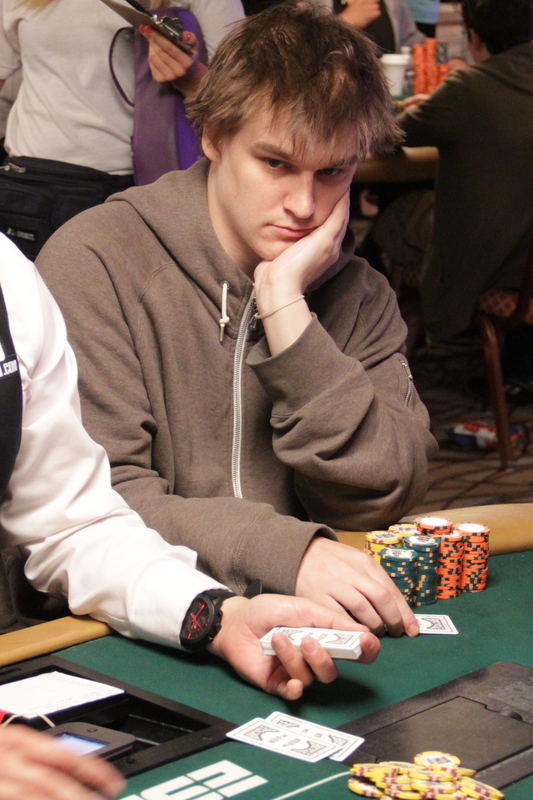






High-Stakes Online Poker Pro Might Be Looking To Retire From Game If He Wins WSOP Main EventScott Palmer Says He Wants 'To Move Away And Try To Learn Something Else' |
|
|
The main event at the World Series of Poker is hard work—12 hours of play each day, fighting off the abyss of boredom while your opponent tanks so long it can be thought of in terms of geological time, and so on—but many in the tournament hope to parlay a deep run into a world of non-work, at least in the sense of being free from the wage. Then there are some who hope to break from poker.
Maryland native Scott Palmer, who rose to prominence playing high-stakes poker on the Internet during the pre-Black Friday era, calls card playing his profession, but he said he might be looking to use a $10 million first-place prize (before paying a ton in taxes and a swap percentage) to step away from a game that he already had to distance himself from thanks to federal law.
In April 2011, Full Tilt Poker and PokerStars were kicked out of U.S. cyberspace by the federal government, and with the shutdown went URnotINdanger2’s bankroll.
“Black Friday was pretty horrible for me,” Palmer said. “I had a ton of money online, most likely more than anyone else on Full Tilt—I’m not 100 percent positive, but it was definitely top three. It put me in a tough spot because I didn’t want to move overseas. I liked where I was at, so I had to decide to stay and be happy or move and make money.”
In order to occupy his time and satisfy his competitive nature on the Internet, Palmer turned to the ultra-tough world of StarCraft 2. It’s a game that suits him well, because long before poker Palmer loved video games. Online poker was, in some sense, just another video game.
While many of his opponents relocated, Palmer chose to remain in Maryland. Black Friday coincided with a $1.2 million downswing he was having online, so a break from poker wasn’t exactly the worst thing in the world. Whenever Palmer returned briefly by traveling to Canada to grind the nosebleeds, he realized the game had changed for the worse. Knowing poker math was no longer a de facto license to print money.
“I’ve played like three months every year since Black Friday, and I’m pretty much break even or slightly winning,” Palmer admitted. “The games have gotten a lot tougher over the past year or so, so I should have taken my money when it was possible.” He explained that no-limit hold’em and PLO are by no means solved, but the edges are razor thin compared to what they once were.

Scott Palmer
For Palmer and others with seven-figure sums locked up, it was winning the main event, but the wait was so long and painful that it was more like a sigh of relief than the high of raking in a pot.
“It was pretty nice. After the first couple of months I was feeling pretty crappy about not selling [the money]. A few of my friends sold theirs for like 85 cents on the dollar, but I just assumed Full Tilt Poker would have held their end up. I guess it ended up working out, but it did take a while before I got it.” Just months later, Palmer was inching closer to another huge payout.
On Sunday at the 2014 WSOP main event, Palmer, who now has a couple of career cashes at the Rio, had one of the largest stacks in the room with just 48 players remaining. More than 6,600 decided they were strong enough at poker to pay $10,000 for a seat.
Palmer said that in previous years in the main event he had a habit of busting out on the third day of play, but this year has been something special. He’s been running scorching hot, as well as punishing opponents with the tactics he fine tuned on the web. He said he owes a lot to friend and high-stakes legend Dan “jungleman” Cates.
“I first met [Dan] when I was 15, and we both were dead broke,” Palmer said. “We both played together and talked about some things, and realized that heads-up was the way to go. I was playing six-max [$1-$2] back then, but switched to heads-up and so did he. He basically just climbed the stakes pretty quickly. He put a lot of time and effort into figuring out the math and what you should and shouldn’t be doing. Thankfully I knew him, and I hate saying it, but I sort of leeched off him (laughs).”
Learning from the best has paid off, but for Palmer it was the journey up in stakes that was the most rewarding, rather than reaching the stratosphere of Internet poker and surviving there. Making the November Nine and winning the main event could finally give Palmer the cushion to pursue something else with his life. There’s still plenty of time—he’s not even 25 yet.
“I would probably—I mean, I already sort of feel like I am retired—but I would probably not play at all,” Palmer said of what his life would be like after winning poker’s most prestigious tournament. “The first couple of years I played poker it was interesting, but I’ve gotten to a pretty high skill cap. The fun was learning the game, but now that I’ve learned it I kind of want to move away and try to learn something else. So, if I win this it will reinforce the fact that I don’t have to get a real job, so I might retire.”
